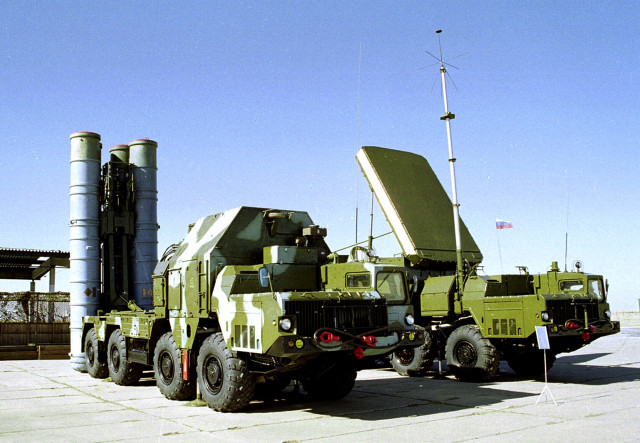By Barbara Slavin
For months now, Russia has been a constructive member of the international consortium negotiating with Iran, often proposing creative fixes to technical hurdles.
But this week, just as the Senate Foreign Relations Committee was taking up sensitive Iran-related legislation, Russia announced that it was going forward with an old contract to sell Iran an air defense missile system that could make it less vulnerable to foreign attack.

FILE – Russian S-300 anti-aircraft missile system is on display in an undisclosed location in Russia (AP photo)
The deal to supply the S-300 is not illegal under UN sanctions, which prohibit selling offensive heavy weaponry to Iran. The message the Kremlin is sending is that Russia is not willing to wait for the conclusion of negotiations on Iran’s nuclear program to lock in the benefits of resumed trade with the Islamic Republic.
It is unfortunate that the government of Vladimir Putin didn’t wait a few months longer. Critics of the Iran deal have been quick to pounce on the announcement as proof that the Barack Obama administration was somehow duped by Moscow and that the Iran framework so laboriously negotiated over the past 13 months is a “sucker’s deal.”
A more insightful way to read Russia’s act is to see it as a recognition of reality that the elaborate web of multilateral sanctions imposed on Iran over the past five years is unraveling and only an egregious Iranian effort to break out and build a nuclear weapon could arrest that momentum.
The Obama administration was only able to persuade the rest of the world to go along with tough sanctions against Iran because the U.S. was visibly committed to a diplomatic solution of the Iran nuclear problem. With that solution now in sight, it is not sensible to try to renegotiate what has already been agreed and seek major new concessions from Iran – as some in Israel and the U.S. Congress have suggested — in the illusive search for a better deal.
Russia has a variety of motives for going through with this sale, which was first concluded in 2007 and postponed by then President Dmitri Medvedev to shore up multilateral diplomacy with Iran.
The first is purely financial: Weighed down by other sanctions tied to its aggressive actions in Ukraine, Russia can use the $800 million it will get for the S-300 system.
The sale is also an easy way for Putin, in the words of Greg Thielmann, a senior fellow at the Arms Control Association, “to stick a thumb in our eye and ingratiate himself with the Iranians, using some of our own lines of argumentation against us.”
Thielmann noted that Russian Foreign Minister Sergei Lavrov has emphasized that the S-300 is a defensive system and thus does not pose a threat to Israel. “This sounds rather similar to U.S. explanations that the Aegis SM-3 going into Romania this year is a defensive system, posing no threat to Russia,” Thielmann told VOANews.
It remains unclear what version of the S-300 Iran will be getting – and when the system might arrive. First introduced to Soviet forces in 1979, it has gone through a number of upgrades. Thielmann said it provides tactical or theater coverage, akin to U.S. Patriot systems, but not territorial defense.
Some Israeli military analysts have said that the system would not preclude an attack on Iran’s nuclear facilities although it would make such attacks “more costly and protracted,” Thielmann said.
While the U.S. reserves the right to take military action to prevent Iran from developing nuclear weapons, the Obama administration has always stressed that the most reliable and least costly way to do this is through diplomacy.
Having reached a general understanding with Iran on the parameters of a deal, the White House now faces the task of completing the agreement by June 30 and convincing Congress not to derail it.
Russia’s announcement came just a day before the Senate Foreign Relations Committee unanimously approved legislation that would allow Congress to review a final deal before President Obama waives sanctions passed by Congress against Iran.
The bill was watered down considerably to shorten the review period and remove links to other issues of contention with Iran, such as terrorism, and is probably the best that the White House could have achieved. A supermajority of 60 senators would have to vote to disapprove a deal and 67 would be needed to override a presidential veto.
If a final agreement is reached along the lines of the parameters agreed to April 2, Congress should be aware of the attitude of U.S. negotiating partners as it reviews the accord.
Britain, France, Germany and China are also eager to restore trade with Iran provided that it implements its nonproliferation obligations.
As much as many people would like to see Iran change other aspects of its domestic and foreign policies, it is wise to focus on the benefits of a nuclear agreement and not make the perfect the enemy of the good.
Decades of unilateral U.S. action have failed to stop Iran’s nuclear advances and only a deal blessed by the international community writ large has a chance of succeeding.
The views and opinions expressed are those of the author and do not necessarily reflect the position of Voice of America.
Barbara Slavin is a senior fellow at the Atlantic Council’s South Asia Center and a correspondent for Al-Monitor.com, a website specializing in the Middle East. She is the author of a 2007 book, Bitter Friends, Bosom Enemies: Iran, the US and the Twisted Path to Confrontation, and is a regular commentator on U.S. foreign policy and Iran on NPR, PBS, C-SPAN and the Voice of America.

